- Главная
- Разное
- Бизнес и предпринимательство
- Образование
- Развлечения
- Государство
- Спорт
- Графика
- Культурология
- Еда и кулинария
- Лингвистика
- Религиоведение
- Черчение
- Физкультура
- ИЗО
- Психология
- Социология
- Английский язык
- Астрономия
- Алгебра
- Биология
- География
- Геометрия
- Детские презентации
- Информатика
- История
- Литература
- Маркетинг
- Математика
- Медицина
- Менеджмент
- Музыка
- МХК
- Немецкий язык
- ОБЖ
- Обществознание
- Окружающий мир
- Педагогика
- Русский язык
- Технология
- Физика
- Философия
- Химия
- Шаблоны, картинки для презентаций
- Экология
- Экономика
- Юриспруденция
Что такое findslide.org?
FindSlide.org - это сайт презентаций, докладов, шаблонов в формате PowerPoint.
Обратная связь
Email: Нажмите что бы посмотреть
Презентация на тему Legal service within travel insurance
Содержание
- 2. Travel insurance is a very
- 3. Where can you buy travel insurance?Travel insurance
- 4. Travel insurance can cover worldwide
- 5. What complaints do we see?We see complaints
- 6. • lost or delayed luggagefor example, a
- 7. How we look at complaints?When we look
- 8. When the complaint is
- 9. Cancel holidayThere are many reasons to cancel
- 10. Missed the trip Policies often include
- 11. Holiday cut short"Curtailment" means that the holiday
- 12. Medical expenses This is an important
- 13. Under most policies, insurance buyers must contact
- 14. Lost or delayed luggage
- 15. Insurers will also exclude claims in certain
- 16. Policy start date When asked when
- 17. Terms and conditions When we consider
- 18. This means we often see disputes relating
- 19. As more consumers buy
- 20. Скачать презентацию
- 21. Похожие презентации
Travel insurance is a very wide-ranging product, designed to provide cover for many eventualities and situations while the policyholder is either on holiday or on a business trip.





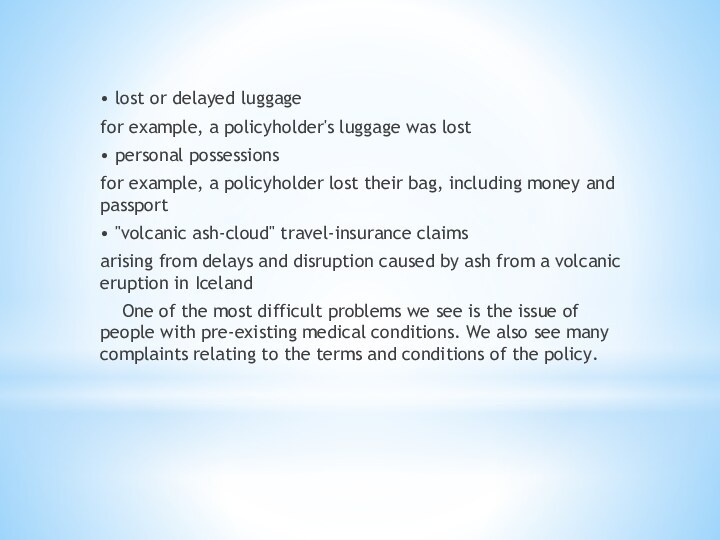





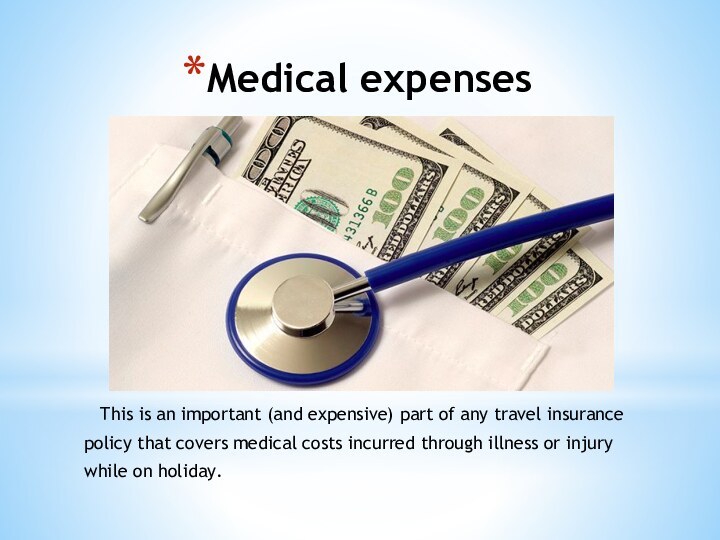
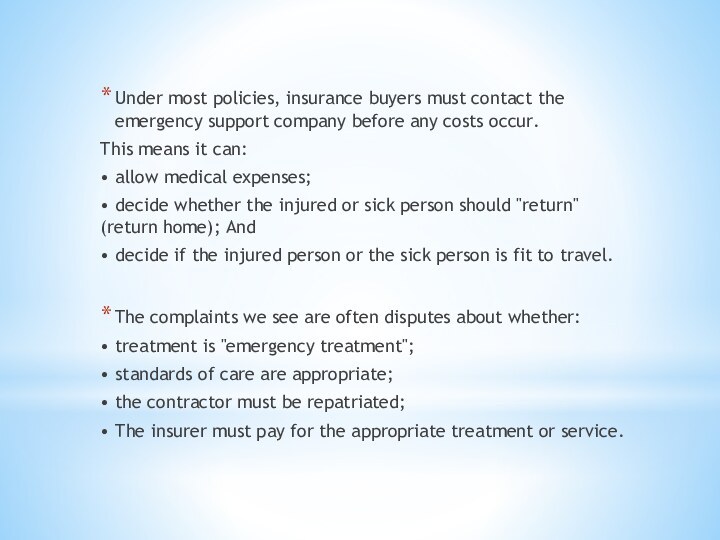

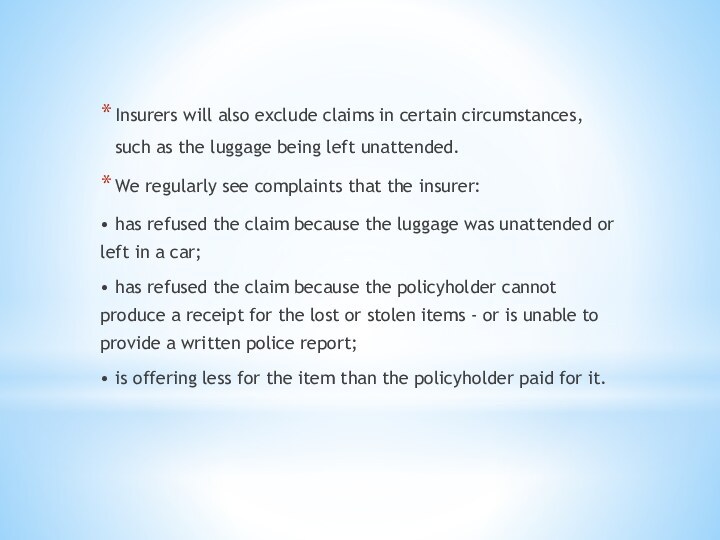
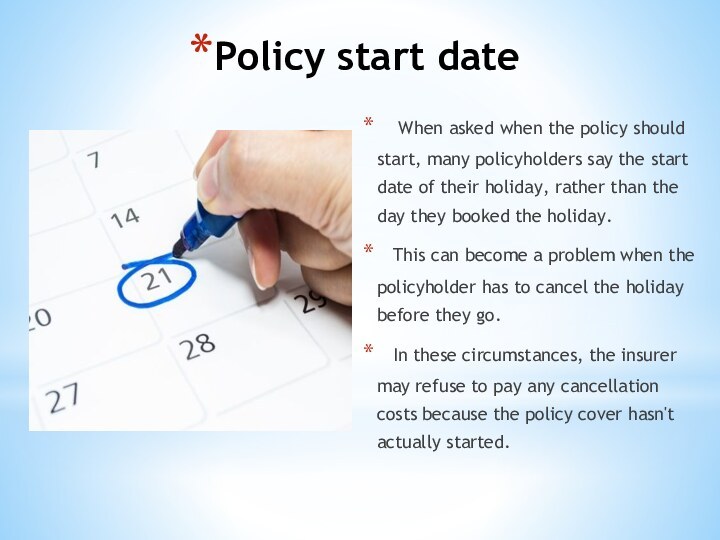


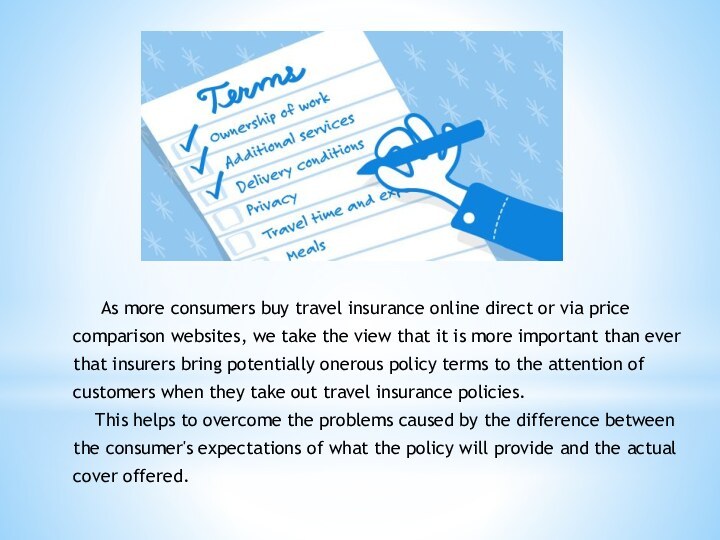

Слайд 3
Where can you buy travel insurance?
Travel insurance is
widely available. You can buy it from:
• insurance companies
• banks
• retailers and
supermarkets• travel agents
• online comparison websites
• holiday companies.
Слайд 4 Travel insurance can cover worldwide travel
- or be limited to travel within the UK
or another geographic area (for example, Europe).It is often (but not always) sold alongside a holiday, when it is known as "connected" travel insurance.
Слайд 5
What complaints do we see?
We see complaints about
all aspects of travel insurance, including:
• cancellation of a
holidayfor example, a policyholder cancelled their holiday because a relative fell ill
• holiday cut short
for example, the holiday was cut short because a policyholder was ill and had to return home
• medical expenses
for example, a policyholder was hospitalised during the trip
Слайд 6
• lost or delayed luggage
for example, a policyholder's
luggage was lost
• personal possessions
for example, a policyholder lost
their bag, including money and passport• "volcanic ash-cloud" travel-insurance claims
arising from delays and disruption caused by ash from a volcanic eruption in Iceland
One of the most difficult problems we see is the issue of people with pre-existing medical conditions. We also see many complaints relating to the terms and conditions of the policy.
Слайд 7
How we look at complaints?
When we look at
complaints about travel insurance, we take into account:
• the
relevant policy wording;• the relevant law;
• any regulations that applied at the time in question; and
• any industry codes of conduct in force at the time in question.
We also review any other relevant evidence, which could include:
• medical reports;
• police reports;
• "property irregularity" reports; and
• claim forms.
Слайд 8 When the complaint is about
policy exclusions or limitations, we take into account any
advice the seller of the policy may have provided - and whether there is evidence that unusual or significant exclusions or limitations were drawn to the customer's attention
Слайд 9
Cancel holiday
There are many reasons to cancel a
vacation or trip before it starts. Nearly all policies
provide insurance coverage for cancellation due to illness, injury or death of the insurer (or of a close relative, such as a close relative).Other cover cases change according to policy. But many insurance businesses exclude many cases. The policy usually includes a list of situations where the insurer can claim, but is usually quite limited.
Слайд 10
Missed the trip
Policies often include including
cancellations due to missed departures - although the cover
provided is generally very limited. Cancellation because the owner changed his mind– for example, because the relationship has ended - will not give rise to a valid claim. Causes are often one of the reasons set out in the policy.
Слайд 11
Holiday cut short
"Curtailment" means that the holiday is
cut short for some reason, usually because the policyholder
or a fellow traveller is unwell. The complaints we see usually focus on these problems:• The insurer is relying on an exclusion clause relating to pre-existing medical conditions and won't pay the claim.
• The insurer says it was not "medically necessary" for the policyholder to cut short their holiday.
Слайд 12
Medical expenses
This is an important (and
expensive) part of any travel insurance policy that covers
medical costs incurred through illness or injury while on holiday.Слайд 13 Under most policies, insurance buyers must contact the
emergency support company before any costs occur.
This means it
can:• allow medical expenses;
• decide whether the injured or sick person should "return" (return home); And
• decide if the injured person or the sick person is fit to travel.
The complaints we see are often disputes about whether:
• treatment is "emergency treatment";
• standards of care are appropriate;
• the contractor must be repatriated;
• The insurer must pay for the appropriate treatment or service.
Слайд 14
Lost or delayed luggage
Insurance policies
have limits on what they will pay out for
lost or delayed luggage.These limits vary from policy to policy and are limited to "depreciated" rates - not "new for old".
Слайд 15 Insurers will also exclude claims in certain circumstances,
such as the luggage being left unattended.
We regularly see
complaints that the insurer:• has refused the claim because the luggage was unattended or left in a car;
• has refused the claim because the policyholder cannot produce a receipt for the lost or stolen items - or is unable to provide a written police report;
• is offering less for the item than the policyholder paid for it.
Слайд 16
Policy start date
When asked when the
policy should start, many policyholders say the start date
of their holiday, rather than the day they booked the holiday.This can become a problem when the policyholder has to cancel the holiday before they go.
In these circumstances, the insurer may refuse to pay any cancellation costs because the policy cover hasn't actually started.
Слайд 17
Terms and conditions
When we consider a
complaint, the terms and conditions of the policy are
a crucial factor. Cover provided by a travel insurance policy is often described in very broad terms, refined by exclusion and limitation clauses.
Слайд 18
This means we often see disputes relating to:
•
whether a travel insurance policy covers a particular event;
•
the impact of an exclusion clause on a pre-existing medical condition; and• limitation clauses, such as monetary limits on lost possessions.
In the cases we see, where a term was likely to have been onerous for the policyholder, we usually expect it to have been brought to their attention when they took out or renewed the policy.
Слайд 19 As more consumers buy travel
insurance online direct or via price comparison websites, we
take the view that it is more important than ever that insurers bring potentially onerous policy terms to the attention of customers when they take out travel insurance policies.This helps to overcome the problems caused by the difference between the consumer's expectations of what the policy will provide and the actual cover offered.





























